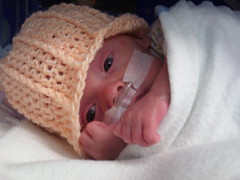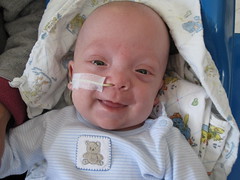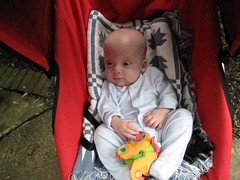Summary: In reaction to his noon feeding, Max had a repeat of his earlier episodes where he spat up some of his feed, his belly got big and taut, his breathing became rapid and shallow and his oxygen sats strayed often into the 80s. The NICU team delayed his 3:00 PM feed until 5:00 PM, by which time his belly had softened and his breathing had slowed. They also gave him a glycerin suppository. On the northern front, they measured his head circumference at around 4:00 PM and found it had decreased 0.5 cm.
We need a term to describe the big freakout when a team of docs and nurses who haven't seen Max before observe him spitting up, having a taut belly and being constipated. It's always a slightly dimished rerun of the Great NEC Scare from a couple of weeks ago.
Carolyn has described a day at the NICU as "a day at the office". And today was a prime example of that phenomenon. I walked in to find Max in the midst of a classic digestive-tract blowup: taut belly, panting, associated desats, etc. The NICU team debated getting an x-ray. Then they kept bringing up an LP. After all, the main problem with Max is his hydrocephalus, so why not tap him? I left the NICU to make a phone call and returned to find everything laid out for an LP.
I sat down with the fellow (effectively, the on-site NICU team leader) and asked him to explain to me the thinking that would lead him to tap Max in response to really bad constipation. He explained that they had done some tests that had ruled out a neurological basis for his tachypnea (ie panting). This didn't strike me as an argument for tapping Max; in fact, quite the opposite. Eventually, he argued himself into the position that he shouldn't really tap Max. As we were talking, we learnt that Max's belly circumference had fallen, and that his tachypnia had stopped. I then had a terrible case of "seller's remorse"--what if the fellow's clinical judgment had been right all along and he was just bad at explaining it to a layman? I was somewhat reassured when they measured his head circ and found that it had decreased from yesterday. So, on balance, I at least think that I didn't do any harm by interfering with the NICU team's original plan of action.
As a general matter, though, I wonder how much management work parents are supposed to do? And whether it helps or hurts? Carolyn notices the occasional error (e.g. running his feed over 60 minutes and not the required 90 minuts), and of course today I affected the treatment course fairly significantly. Does this kind of clinical monitoring decrease errors by the NICU team ("Better double check anything you do to bed 16, those parents parents are detail fiends")? Or does it earn us reputations as problem parents, thus inhibiting the free flow of information from caregivers ("Don't tell the parents of bed 16 that we accidentally ran his last feed twice as fast as we were supposed to--they're total fiends for detail")? It's natural to try to curry favor with the people who are with your children around the clock, and it's disturbing to think that they would be making mistakes if you didn't monitor them.
skip to main |
skip to sidebar

Max was born in October 2008 at Georgetown University Hospital. After more than four months at GUH, Max moved to the HSC Pediatric Center in March 2009. He came home six months after he was born, in April 2009.
A TUBE-FREE MORNING

Start Here: A list of posts with background information
- We're home! (leaving the hospital with Max)
- The hospital at home (what it's like to care for Max at home)
- Max in action (see Max do his tricks)
- How is Max? (update April 2009)
Most recent photos of Max
Blog Archive
-
▼
2008
(100)
-
▼
November
(31)
- Evening update (Sunday 11/30): Another day at the ...
- Midday update (Sunday 11/30)
- The little astronauts
- Evening update (Saturday 11/29) - Holding Pattern
- Max's head circumference, by the numbers
- Man in Space
- In the NICU fridge
- Treat the patient, not the x-ray
- Evening Update (Friday 11/28) -- Not a bad day at all
- Morning update (Friday 11/28): A lot of bad news
- Evening update (Thursday, 11/27)
- Max Turkey Foot Card
- Max Turkey Foot Card
- Early morning update (Thursday 11/27)
- Head bleeds, by the numbers
- Learning about stressed-out preemies
- The ABDs of the NICU
- Midday update (Wednesday 11/26)
- Early morning update (11/26)
- Midday update (Tuesday 11/25)
- Early morning update (Tuesday, 11/25)
- Early thoughts on Max and his hydrocephalus
- Max and his head bleeds
- Max Gets a Bath
- Evening Update (Monday 11/24)
- Midday update (Monday 11/24)
- Nightly roundup (Sunday, 11/23)
- Taking it one day at a time
- The great NEC scare of last week
- Max
- Max's Spa
-
▼
November
(31)



